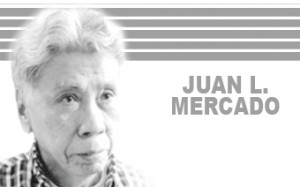 TALIBON,  Bohol – Revisiting this calm, quiet and clean city is always a pleasure. This is the birthplace of President Carlos P. Garcia.
TALIBON,  Bohol – Revisiting this calm, quiet and clean city is always a pleasure. This is the birthplace of President Carlos P. Garcia.
They called him the “Black Beautyâ€, because of his dark complexion. Will that tickle Vice-President-elect Jejomar Binay? He too is “permanently sunburned”. And he dreams of becoming Numero Uno, as Garcia of Talibon did.
In this province, countless streets, buildings, even basketball courts, are named after Garcia. “CPGâ€Â was the hometown kid who made it to the big leagues. But his National Historical Commission statute, in front of the town hall, could do with a fresh coat of paint.
Bohol has always been deeply religious. You catch glimpses of that in magnificent ancient churches built by Jesuits and other missionaries during the colonial period. (The theft of icons and shabby maintenance of these historical treasures are another story.)
The wife and I came to attend the ordination to the priesthood of two family friends. A “guest†at the rites was the Papal Nuncio to Haiti. The archbishop, it turns out, is a native of Talibon. Our “OFWs” include diplomat-priests. The nuncio was visiting to mark the silver anniversary of his sacerdotal ordination.
The road network in Bohol is excellent. And Talibon has progressed since the last time we visited. The wife and I find a brand new building has replaced the ramshackle the hotel we lodged in last time. Now, the staff can iron your barong within the day. Last time around, it took two days.
No panhandlers descend on you, then and now. There’s none of scrawny children that swarm the streets of Cebu, Davao or Manila, descend on the town during fiestas, it was explained to us. Desperate grinding city poverty, however, does not visibly mar this town.
But how deep have the changes really run?
Now as in the last trip, we watched students board pumpboats in the twilight. The outriggers ferry them to them to homes on islets, off this placid won on Bohol’s eastern coastline.
Poverty, though, is all too real. It affects about 40 percent of the population. Life expectancy of Boholanos is 69 years, two years shorter than that of Cebuanos’ 72. But it is 12 years longer than those in Lanao del Sur. And Life is the threshold at which all other hopes begin
Philippine Human Development Report ranked Bohol 25th out of 77 provinces. Rizal tops the list. Sulu limps in at the tail-end. From an international perspective, Bohol is wedged somewhere between that of Vietnam and Indonesia,
Inequality here resembles that of other places, say Bukidnon or Sorsogon. The richest 10 percent consume 30 centavos out of every peso. The poorest 10 percent make do with three centavos.
Out of every 100 students in Bohol, 33 graduates from high school, the UN has noted. That’s on par with Marinduque –but far behind Laguna’s 60.)
UP economist Ernesto Pernia ( a Boholano) and  Arsenio Balisacan  say many  factors—from population growth, corruption, quality of governance to ecological decay – can embed penury.
On Talibon’s pier one notes the still primitive fishing boats and obsolete gear. Here as in many parts of the Philippines, such boats slosh their way through once pristine seas.
Today, their bows cut through all kinds, of non-degradable garbage: shopping bags, juice containers, bottles; broken plates, etc. Untreated sewage sludge, oil, chemicals and other garbage contaminate the waters turning it turgid.
“Fishers are the first to encounter limits of the sea†All 17 of the world’s major fishing areas reached – or exceeded – sustainable thresholds, UN’s Food and Agriculture Organization warns. Catches of valuables commercial fish have declined.
On Talibon’s wharf, as in other piers of this country, fishers unload their catches from battered styro foam boxes packed with ice. They’re small stunted “trash fishâ€. Fishing grounds have been depleted. The small catches cut into – protein supplies for the poor who can’t afford meat.
History tells us that “90 percent of the history of life on earth has taken place in the seas†And the coasts are natural crossroads between man and the sea. Now plastic and dirt are sealing of the pathway. (By Juan L Mercado – Email: juanlmercado@gmail.com)
